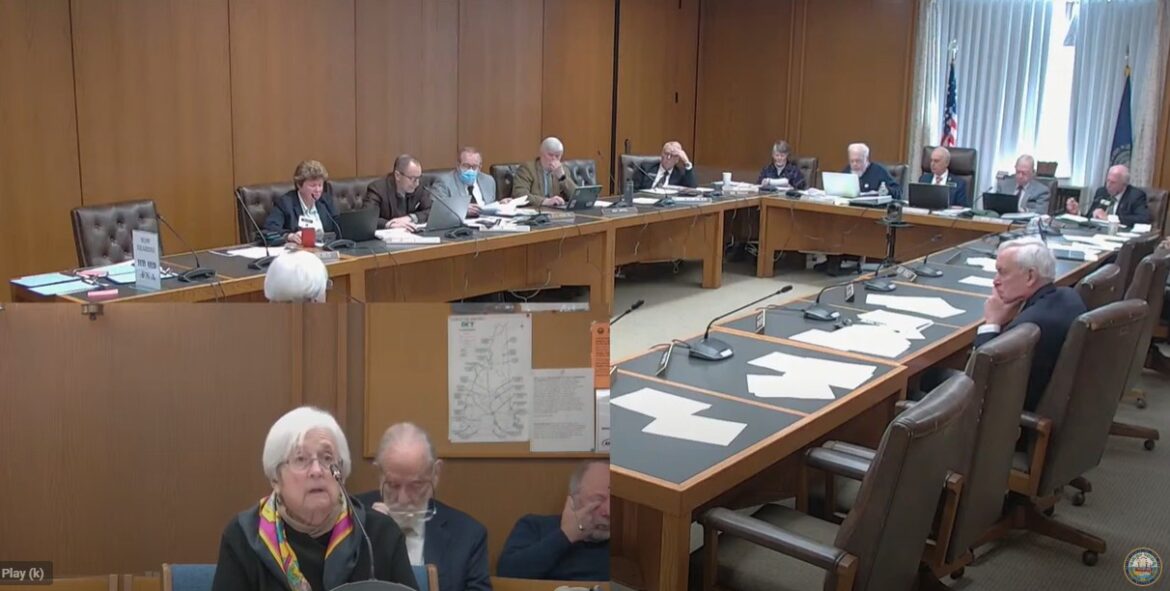By PAULA TRACY, InDepthNH.org
CONCORD – State Rep. Marjorie Smith, D-Durham, offered a bill that she said would be “constitutional, equitable and fair” to adequately fund public education across the state but opponents said it would be a huge cost burden to property taxpayers in a tough year.
The veteran legislator told the House Ways and Means Committee Wednesday that House Bill 669-FN addresses how the state raises the money to conform with a constitutional obligation.
It sets the Statewide Education Property Tax or SWEPT rate at $5.00 per $1,000 of property valuation (assumed to be equalized property valuation for the purpose of this fiscal note) and would raise in the first year $1.62 billion which would be an increase of $1.26 billion from the current amount.
The money would go directly to the Education Trust Fund not to be retained by the municipalities, she said.
“Who knows? We might be finally able to resolve this,” Smith said.
She said she recognizes there are a lot of bills that are attempting to address the issue and this is only one aspect, if it passes.
“What happens after that related to education is for other committees,” she said.
Currently, the matter of whether the state is adequately paying its share is before the state Supreme Court following a 2023 suit in which the Superior Court ruled the state is not paying its fair share.
Another lawsuit is also pending.
“This revenue figure would put us in about the middle,” rather than the dead last in the nation in terms of state education spending, she said in response to questions by state Rep. Susan Almy, D-Lebanon.
“It looks like it is still going to be assessed locally, collected locally and then sent to the state,” Almy said.
Smith said her bill “ensures that all taxpayers, no matter where they live will pay the same rate,” she said. There would be a one-time cost of $300,000 for DRA to implement the electronic filing.
She noted it solves the issue of property wealthy towns being “donors” to others.
Smith said there are not a lot of people in the Democratic caucus who are fans of charter schools but she said she believes choice about how a particular child should be educated is important, provided it meets accountability and transparency standards for use of public funds.
Rep. Jonas Wheeler, D-Peterborough, a co-sponsor of HB 669, a graduate of Con-Val High School, noted that the unequitable rate of funding education when he was growing up and continues is not fair for kids who live in another town or district.
“I don’t think this is an appropriate situation for our state,” he said.
“I believe in a fair rate for all taxpayers…rather than shifting that burden on to other” cities and towns.
State Rep. Dan McGuire, R-Epsom opposed the bill.
He said “you have got to look at this as a big tax increase. Are you comfortable with that? I don’t know…”
To him the bill is like a huge slice of chocolate cake, “very inviting” but could have implications down the road.
McGuire said it will raise another $900 million or more when “we have an extremely tight budget.”
But he said there are parts of the bill that are appealing and could be merged somehow into a solution.
“But to have a tax increase of that magnitude,” he said, “our citizens will have to pay it. It is a lot more money collected.”
And he worried about the rate going up.
He suggested the committee retain it until some other bills come through.
It is an early bill and will need to go to the finance committee as well, he was told.
McGuire said in the House Education Funding Committee that we have a bill that imposes a school budget cap “along with this kind of an idea.”
The state is spending close to $20,000 a year per pupil and that is not the lowest in the nation but the state portion is the lowest in the nation.
Douglas Hall, who was a member of the House for four terms and on the finance committee before the Claremont decisions when the state had the Augenblick formula.
He said from 1997 to 1999 he watched the legislature fund adequacy.
If everyone had left “well enough alone” there would be no lawsuits the way it is today.
Then, a $6.60 rate would have left well enough alone in the Education Funding account.
He handed out charts that show what each community would pay and said the bill fixes a number of problems.
First it requires everyone to pay the same rate.
Hall said if passed the bill would give the state “something to work with” if the court cases come down.





